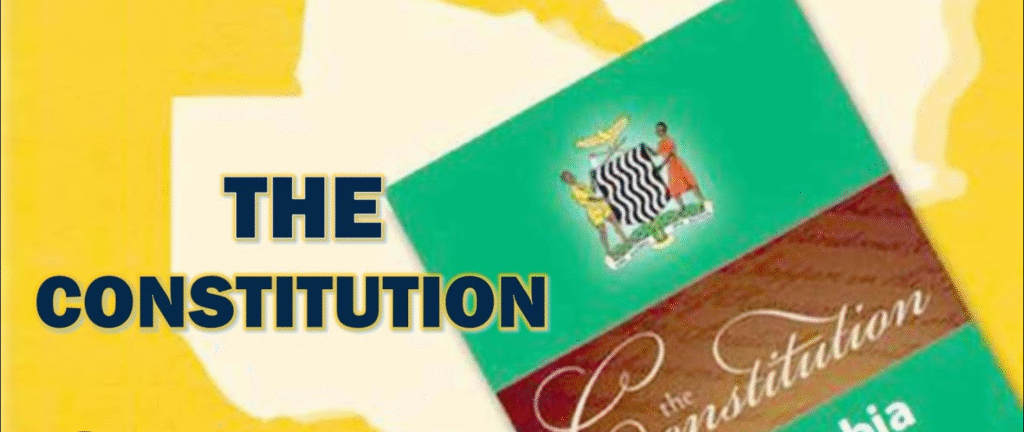In every democracy, there comes a moment when the true intentions of those in power are revealed—not through speeches or manifestos, but through their dealings with the constitution. Zambia has reached such a moment with the UPND’s pursuit of Bill 7, a legislative proposal that has raised red flags among citizens, civil society, and governance experts. While the ruling party insists that the bill is designed to “clean up” the constitution and strengthen governance, the manner and speed with which it is being pushed tell a very different story—one that reflects political arrogance, elitism, and the dangerous belief that a handful of politicians know better than the entire population.
Constitutional reforms are not routine legislative adjustments; they are profound national undertakings that should be approached with caution, humility, and broad public participation. In Zambia, however, constitutionalism has too often been treated as a playground for political experimentation. Every new government, intoxicated by the allure of power, feels compelled to tamper with the constitution, not out of necessity but out of political convenience. The UPND, despite its earlier opposition to similar maneuvers by previous administrations, now stands accused of replicating the same conduct it once condemned. Bill 7 has therefore become a symbol of a deeper democratic problem: leaders who, once in power, begin to believe that their judgment supersedes that of the people who elected them.
The central issue with Bill 7 is not merely its contents but the attitude surrounding its promotion. The tone emanating from certain corners of government suggests a condescending view of the electorate, as though ordinary Zambians lack the intellectual capacity to understand constitutional risks or appreciate the implications of such amendments. This elitist approach is not only undemocratic—it is profoundly disrespectful. A country’s constitution belongs to its people, not its political class. It is a social contract, not a political weapon. Yet Bill 7 appears to treat the constitution as a malleable partisan instrument, shaped to serve immediate interests rather than the long-term stability of the nation.
Zambia has walked this perilous path before. Under the Patriotic Front, citizens fiercely resisted Bill 10, recognizing it for what it was: a political project disguised as reform. The UPND, then in opposition, stood firmly with the people, decrying the manipulation of constitutional processes. It is therefore disturbing to witness the same party, now in power, seemingly flirting with the very tendencies it once condemned. This political amnesia, where leaders forget the principles they championed before assuming office, is one of the recurring maladies afflicting Zambia’s democracy.
The danger of Bill 7 lies not only in its timing but in its potential to deepen public distrust. Democracies do not survive on trust alone; they survive on transparent processes, dialogue, and consensus. A government that rushes constitutional changes without fostering national dialogue risks creating suspicion about its motives. What is the urgency? Who stands to benefit? Why the resistance to wider consultation? These questions linger unanswered, fuelling perceptions that Bill 7 may be less about national progress and more about political consolidation.
Citizens have every right to ask these questions because they are neither stupid nor uninformed. The era when governments could manipulate constitutional changes under the cover of public ignorance is long gone. Today, Zambians are more politically aware, more engaged, and more vigilant. Any government that underestimates this transformation does so at great political risk. Silence should not be interpreted as endorsement, nor should public patience be mistaken for approval.
If the UPND truly believes that Bill 7 is in the nation’s best interest, then the path forward is straightforward: submit the bill to rigorous public scrutiny. Open the doors for citizen participation. Invite independent experts. Allow civil society and opposition parties to debate the merits and dangers of the proposed changes. A constitutional amendment carried out in the spirit of transparency strengthens a democracy. One pushed through political maneuvering weakens it, divides the nation, and sets a dangerous precedent.
Ultimately, Zambia stands at a critical juncture. Bill 7 has become more than a legislative proposal; it has become a test of the UPND’s commitment to the democratic principles it once championed. Will the ruling party uphold the spirit of constitutionalism, or will it succumb to the temptations that have derailed previous administrations? The answer to this question will shape the nation’s democratic trajectory for years to come.
What must remain clear is that a constitution cannot be imposed on a people by leaders who think they are smarter, wiser, or more enlightened than everyone else. Political power is temporary; the constitution is enduring. And when leaders begin to treat it as a partisan document rather than a national covenant, they undermine the very foundations of the democracy they claim to protect.
Zambians deserve constitutional reforms anchored in dialogue, transparency, and respect—not political arrogance disguised as progress. Bill 7 may yet prove to be the moment when citizens remind the political elite of a timeless truth: the power to govern comes from the people, and the people will not be sidelined.



